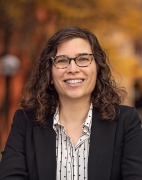Science, Technology, and Public Policy (STPP) graduate certificate program
Overview
The Science and Technology in Public Policy (STPP) graduate certificate program is designed for students already enrolled in a graduate degree program at the University of Michigan. Master’s or doctoral students from any field are welcome to apply. No background in science or in policy is required.
In 12 credit hours of course work (two core courses and two electives), students learn how science and technology are influenced by politics and policy; analyze the role of science and technology in the policymaking process; develop policy writing skills; gain methods and tools for science and technology policy analysis; and explore the political and policy landscape of specific science and technology areas, including biotechnology, information and communication technology, energy policy, and more.
Learn how to apply to the STPP certificate program.
The program provides students with tools to analyze complex science and technology policy issues and to consider the following types of questions:
- How are science and technology influenced by the policy process?
- What is the rightful place of science in public policymaking?
- What values and assumptions underlie our current understanding of science and technology?
- Who should make decisions about science and technology policy? Only experts? Or should lay people also have a voice?
- How should policymakers deal with the risks and uncertainties that come from new science and technology (e.g., biotechnology, nanotechnology, geoengineering)?
The STPP experience doesn't end in the classroom. Students attend lectures on a wide variety of topics—biotechnology, public health, energy, sustainability, and more—by active players in the science and technology policy field. STPP students also have a chance to meet the speakers for lunch and other small-group interactions and to ask questions about their work and field. Other STPP gatherings include regular movie nights (with pizza, naturally); a yearly career luncheon with professors, postdocs, and senior students; and opportunities to participate in special policy engagement projects.
STPP gives students an excellent opportunity to meet and collaborate with people in a wide range of fields. STPP students and faculty hail from the natural sciences, engineering, business, law, dentistry, public health, and public policy. Through these interdisciplinary relationships, students have a chance to build their professional networks, so they leave not only with a certificate, but also with relationships with colleagues in a wide range of fields, preparing them to work in an increasingly interdisciplinary world.
With an STPP certificate, students are prepared to:
- Participate in the politics and policy of science and technology as government officials, members of non-governmental organizations, or practicing scientists/engineers.
- Engage in science and technology policy analysis through think tanks, industry, or academia.
Prepared to serve
In their roles as the heads of research labs, scientists and engineers constantly feel the impact of science and technology policies and are often called upon to serve as expert witnesses for congressional hearings or to sit on government advisory committees.
The STPP certificate prepares graduate students to play such roles in the future. They learn about the policy process related to the conduct and management of research and development, the distinguishing economic characteristics and consequences of science and technology, the political issues that come into play when science moves out of the laboratory and into the policy domain, and the broad policy frameworks within which science and technology activities occur.
Careers in science and technology policy
There are many options available to students with an interest in science and technology policy. Some of our graduates choose to work for U.S. or foreign government agencies (e.g., U.S. Congress, European Parliament, U.S. Government Accountability Office, U.S. Food and Drug Administration, Indian Council for Medical Research). Others choose to work for non-governmental organizations including professional societies, medical charities, or civil society advocacy groups.
Most high-tech companies also have government affairs offices that are likely to be interested in students with STPP backgrounds. Finally, some students might choose to pursue careers in science and technology policy research in think tanks (e.g., Woodrow Wilson International Center for Scholars, Mathematica Policy Research) or academia. See Related Academic Programs for more organizations that might employ STPP graduates.
Coursework
The STPP certificate requires 12 credit hours of coursework, including two core courses and two electives of the student's choice. These courses can be taken in any order.
Students can choose two electives from among a variety of courses offered across the university and listed here. They are also expected to attend STPP seminars. In some cases, students may want to "double count" courses that they are already taking as part of their graduate coursework requirements. Please refer to the STPP site for current Rackham graduate program requirements.
Required STPP core courses
| PubPol 650 |
Introduction to Science and Technology Policy Analysis (winter term) |
| PubPol 510 |
The Politics of Public Policy (fall term) |
Completion of program
Once all requirements have been fulfilled, all certificate students must apply to graduate through Wolverine Access. If a certificate student is in a master's degree program or has received an embedded master's along the way to a PhD, the student must also complete a dual/joint degree course election form available on Rackham’s website. This form is used to verify that the double-counting rules have been followed. Questions about program completion can be directed to Student Services at 734-764-0453 or [email protected].
